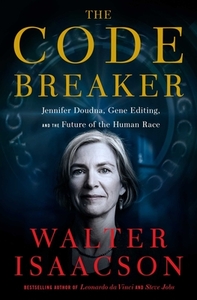Take a photo of a barcode or cover
884 reviews for:
The Code Breaker: Jennifer Doudna, Gene Editing, and the Future of the Human Race
Walter Isaacson
884 reviews for:
The Code Breaker: Jennifer Doudna, Gene Editing, and the Future of the Human Race
Walter Isaacson
informative
inspiring
medium-paced
I won this in a Goodreads giveaway and it is such a timely read! It covers the development of CRISPR gene editing technology and its applications, including its role in addressing the coronavirus pandemic and the ethical implications of gene editing (which came to a head during the 'CRISPR baby scandal' of 2018-2019). He particularly focuses on Jennifer Doudna, who, along with her co-researcher Emmanuelle Charpentier, won the Nobel Prize in Chemistry in 2020 for her work on CRISPR, but also includes a larger cast of scientists that each provided significant contributions to the field. It dovetails well with his earlier book "The Innovators" (about the digital revolution), as he approaches the genetics revolution from a similar perspective, emphasizing the collaborative nature of great achievements and the competing strategies of open community initiatives versus covert proprietary ones. I found the book to be a bit slow in the very beginning, but once the CRISPR competition in the scientific community heated up, I was hooked.
It’s between 3 and 4 stars. I appreciate how Isaacson writes, but this one took a while to figure out what kind of book it wanted to be. It’s worth reading if you are interested in gene editing or biology academia.
informative
medium-paced
informative
medium-paced
informative
inspiring
medium-paced
informative
inspiring
medium-paced
Although sold as a biography of Jennifer Doudna, it really is a biography of the [still-very-young] CRISPR and gene editing technology. The book goes all the way back to touch upon Watson and Crick's discovery of DNA (along with Rosalind Franklin), and brings us up to relatively present (2020) applications of CRISPR. Isaacson does an excellent job of explaining CRISPR concepts and discoveries, and I found myself getting excited about all the cool ways these molecules work. I wanted to learn more! (Though, to be fair, I did get a minor in biochem in college). I appreciated how there were actually a series of mini-biographies of many of the major players in CRISPR, such as Zhang, Charpentier, and He Jiankui of "crispr baby" notoriety. Other themes were the interplay between academia and industry, and the cutthroat nature of "scooping" and "credit" in science. The book thus acknowledges the diverse players, competitors and collaborators that lead to discoveries in modern science. The first 2/3rds focused on these scientific processes and characters, but the last third is more about ethics and COVID19. While relevant, it felt too broad of a brush (I could read another book about bioethics, if that was my interest) and stopping the CRISPR story at COVID19 applications felt too abrupt. This "biography" will undoubtedly need an update as Doudna, and CRISPR's, story are still so young and constantly evolving.
Ha sido una fascinante lectura que me ha dejado cautivado y deseoso de saber más sobre el tema. Posiblemente la edición genética es la próxima gran revolución y también cabe la posibilidad de que, tal como pasó con la computadora personal, la democratización de CRISPR y su acercamiento a la gente común lleve a acelerar sus aplicaciones y usos. Desafortunadamente se cierne sobre estos avances el peligro de alterar de forma irreversible lo que somos e incluso de extinguirnos, por lo que debemos aprender a ir con cuidado.


